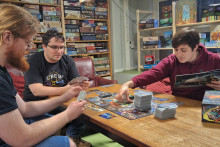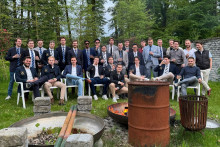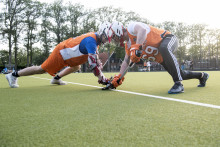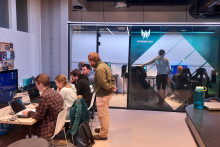After lying dormant for several years, the Twente Debating Society (TDS) was revived in 2021 by a group of UT students. The original club, founded in 2011, basically no longer existed, says Viktoriia Konashchuk, a student of Business Information Technology (BIT) and last year's board member of TDS. 'The board before us had to rebuild the debate club from scratch, which they managed to do. Since then, we have been able to organise several debate evenings again.'
According to Konashchuk, these sessions are not just about debating. 'It is also an exercise in public speaking, which is a very useful skill for the rest of your life.' The students of the Twente Debating Society use the British-parliamentary method, dividing the group into four teams of two debaters. Two of the teams belong to the government, the other two to the opposition. 'In the end, a jury decides which team won,' says fellow board member and BIT student Tymur Astashov. 'Participants are also provided with feedback afterwards.'
Role play
At times they deal with political issues, but that is by no means always the case. 'It's not like we all have political ambitions,' says Konashchuk. 'I think about half of the debates are about current political issues. The rest of the time we debate day-to-day topics. Think of statements like 'pizza with pineapple is better than without'. Or something more serious like: 'Zoos should be banned'.’
All participants are assigned specific roles. 'The other day, for example, we were debating the legalisation of drugs,' Konashchuk continues. 'One of the debaters then assumed the role of a father. It's not about your own opinion, but about how well you can represent the point of view of a certain group in society. We also encourage people to be totally immersed in their role.'

Tips & tricks
Above all, a good debater maintains a structured speech, Konashchuk and Astashov know. 'Otherwise, it becomes a mess. Both the opponent and the jury will find it hard to understand.' A structured argument consists of a counterargument, your own argument and an example, they explain. 'Presentation is also important. It is best to tell your story calmly and with confidence.'
Examples of good debaters from history, for example from politics, are not easily named by the two students. 'I rather see other debate clubs as our examples,' says Astashov. 'Some Dutch teams have been doing it for more than 20 years. There is a lot to learn from them. Last summer, we participated in the Dutch Debating League, the internal competition of Dutch debating societies. Unfortunately, we did not score any points. Clearly, we still need to gain more experience and that takes time. But the participation was very helpful and we will come back one day to win the competition.'
New members
The Twente Debating Society has an app group with about 70 interested people, although not all of them are active. There are many internationals involved in the Society, so debating is done in English. The board is busy arranging official recognition by the Student Union. 'We hope to achieve that this year. In the meantime, we are trying to attract new members. Soon, we will therefore start our kick-off evenings, where we will introduce potential debaters to our club while enjoying free chips and a drink. For many people, it will be their first real debate. Fortunately, we will have suitable entry levels for everyone.'








